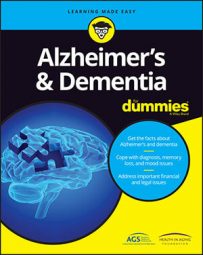Think of dementia as a big general category like the word "building." Just as there are many specific types of buildings (stores, houses, cabins, skyscrapers, factories, and so on), there are many specific forms of dementia. Alzheimer's disease (AD) is the most common cause of dementia, making up about 60 percent of dementia cases.
Dementia isn't a single entity. Multiple different medical conditions that affect normal brain functioning are causes of dementia.
The World Health Organization (WHO) defines dementia thus: [A] syndrome — usually of a chronic or progressive nature — in which there is deterioration in cognitive function (i.e. the ability to process thought) beyond what might be expected from normal aging. It affects memory, thinking, orientation, comprehension, calculation, learning capacity, language, and judgment. Consciousness is not affected. The impairment in cognitive function is commonly accompanied, and occasionally preceded, by deterioration in emotional control, social behavior, or motivation.
This definition, however, still contains a fair amount of medical jargon. So here's a simpler, but still accurate definition of these terms:- Syndrome: This word describes the symptoms that together are characteristic of a particular medical condition. People with the condition have most of these symptoms but don't have to show all of them to receive the diagnosis. Thus with dementia, one person may have poor memory and language but still have judgment enough to not walk out into a busy road, whereas another may have problems with both memory and judgment but have no changes in language skills.
- Chronic and progressive: These terms mean that the condition is ongoing long term and gets steadily worse with time. Many people think that the word chronic means that something is severe. Although dementia may be severe for some people, it's mild in others; chronic here means long-lasting.
- Consciousness: Used in relation to dementia, this word takes on both of its meanings. People with dementia are both awake (as opposed to unconscious) and mentally aware of their surroundings, although what's going on around them is confusing to them.
A number of diseases of the brain that lead to a collection of progressively worsening symptoms affecting a person's thought processes, mood, and behavior can cause dementia; eventually, the person loses the ability to carry out the basic tasks of daily living.
In the past, dementia has been referred to as "senility" or "senile dementia." This terminology reflects the previously common but incorrect belief that serious mental decline is a normal part of aging. Many myths and misunderstandings circulate about dementia. And to get a grasp of what dementia actually is, it's important to have a clear idea about what it certainly isn't.So here's a selection of some of the most common misconceptions to help sort fact from fiction:
- All old people get dementia. Although the chances of developing dementia do increase as people get older, it's not a normal part of the aging process. In the United States, 1 in 9 people older than 65 and 1 in 3 older than 85 suffer from it.
- Dementia is the same as Alzheimer's disease. Alzheimer's disease is just one of a number of brain diseases that lead to dementia.
- Memory loss equals dementia. Dementia does affect memory, but for someone to be diagnosed with the condition, he needs to show many other more complex symptoms rather than simply poor memory alone.
- Everyone with dementia becomes aggressive. Even though some people with dementia can become agitated, aggression isn't a universal feature of dementia and is usually triggered by the way someone is treated or communicated with rather than being a symptom of the dementia alone.
- A diagnosis of dementia means a person's life is over. Despite the fact that the condition is chronic and progressive, many medical, social, and psychological treatments and strategies are available to help make life as fulfilling as possible for someone with dementia, for many years.
- Everyone with dementia ends up in a nursing home. Although one-third of people with dementia do eventually need this level of intense care in the later stages of their condition, many people are able to access enough help and support to stay in their own homes.
- My aunt has dementia, so I'm going to get it too. Some forms of dementia do have a genetic component and may run in families, but these are in the minority. For most people, it doesn't follow that because a relative has dementia, they'll get it too. And contrary to what one patient thought, you can't catch it from your aunt either.

